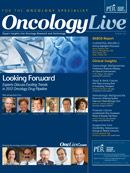Lenalidomide Plus Docetaxel: Phase III Results Fall Short
The combination of lenalidomide and docetaxel for treatment of CRPC failed to produce results in the large phase III MAINSAIL trial.
Daniel P. Petrylak, MD
Professor of Medicine, Co-Leader, Prostate Cancer
Program Director, Genitourinary Oncology Section, Herbert Irving Comprehensive Cancer Center, Columbia University Medical Center, New York, NY
The combination of lenalidomide and docetaxel for treatment of castration-resistant prostate cancer (CRPC), which showed promise in phase II trials, failed to produce results in the large phase III MAINSAIL trial, leading to the trial’s discontinuation.
Docetaxel plus lenalidomide has activity in CRPC, but results of a phase III trial were needed to determine if the regimen was superior to standard docetaxel/prednisone, said Daniel P. Petrylak, MD, professor of Medicine at the Herbert Irving Comprehensive Cancer Center at Columbia University Medical Center in New York City. Petrylak discussed the investigational regimen at the Chemotherapy Foundation Symposium, which was held in November before the announcement about the MAINSAIL trial.
Thalidomide, the parent compound of lenalidomide, has been evaluated extensively in CRPC. Lenalidomide has a different safety profile, with greater in vitro immunomodulatory effects than thalidomide. Preclinical data suggest that both drugs have antiandrogenic activity. In addition, they inhibit tumor necrosis factor (TNF)-alpha, interleukin (IL)-1 beta and IL-6, and stimulate IL-10.
Early studies in CRPC showed that singleagent thalidomide achieved a decline in prostatespecific antigen (PSA) of 18% to 40%, but as a single agent, the drug had concerning toxicity. Thalidomide was also studied in combination with weekly docetaxel (before it became known that docetaxel every 3 weeks was superior for survival); that combination achieved PSA declines of 51% to 66%, with acceptable safety. A different group of investigators showed PSA declines with thalidomide/paclitaxel/ estramustine, with acceptable safety.
Lenalidomide was also studied as a single agent in CRPC. In a very small study of 12 patients, there were no complete or partial responses, but disease stabilization was achieved and the drug also demonstrated PSA declines of >50% in 12% of patients.
These preliminary studies led to a phase I/II study of the combination of docetaxel/ lenalidomide in patients with CRPC. The first cohort included 30 patients with progressive disease and up to 2 prior chemotherapies. Mean age was 70 years and mean PSA was 110 ng/dL.
In the phase I dose escalation study, all patients received dexamethasone prior to docetaxel and oral prednisone 5 mg bid; docetaxel was given every 3 weeks and lenalidomide was given on days 1 to 14 of a 21-day cycle. Overall response rate was 56% in patients with no prior chemotherapy and 31% in those treated with prior chemotherapy. Adverse events were as expected; serious adverse events included 3 patients with deep vein thrombosis, 2 with significant neuropathy, and 12 with neutropenia.
“My impression of this regimen is that it has acceptable tolerability. We saw PSA declines in patients who progressed on prior docetaxel therapy, which implied activity of the combination,” Petrylak said.
MAINSAIL, an international, randomized, controlled phase III trial, had been accruing patients with CRPC for about a year, with a planned enrollment of >1000. Patients were randomized to receive either docetaxel/ prednisone/lenalidomide or docetaxel/ prednisone/placebo. The goal was to see if the investigational regimen could improve overall survival by 30%.
However, in late November 2011, the trial was discontinued on the recommendation of the Data Monitoring Committee, which determined that the investigational regimen did not demonstrate a statistically significant treatment effect against the primary endpoint of overall survival versus docetaxel/prednisone/placebo.
Other investigators continue to look at various combinations of docetaxel/lenalidomide. One trial that Petrylak mentioned is an ongoing National Cancer Institute trial that includes 46 patients with CRPC treated with docetaxel/bevacizumab/ lenalidomide. All patients receive enoxaparin prophylaxis for deep vein thrombosis. This triplet achieved a significant overall response rate of 87.5%, he said. A concerning adverse event was osteonecrosis of the jaw, but the mechanisms related to this are unclear.
The role of bevacizumab with or without lenalidomide in combination with docetaxel is another question that needs further study. With bevacizumab, ongoing treatment is needed to maintain response




